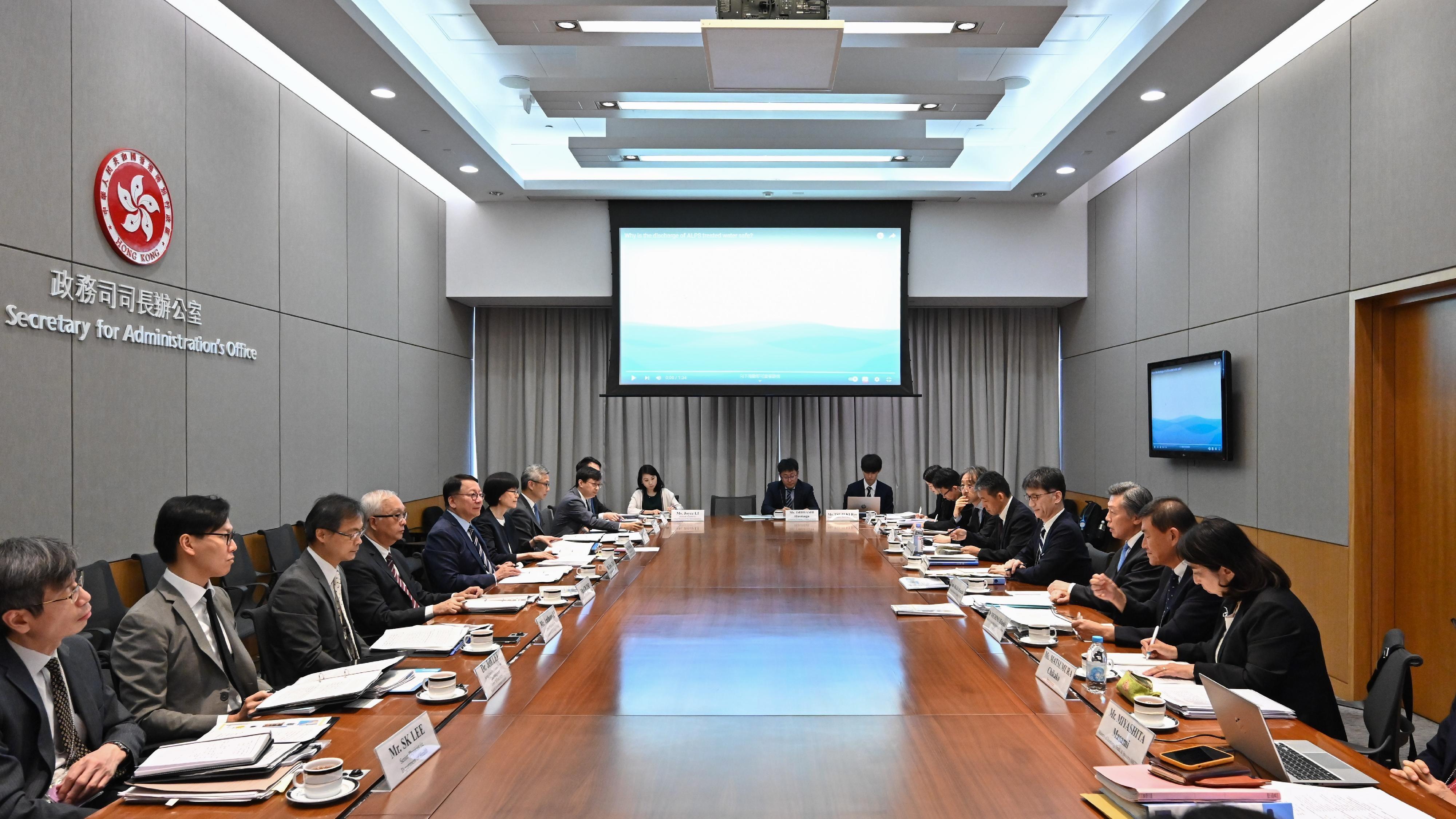 Chief Secretary for Administration Eric Chan Kwok-ki (fifth left) and Secretary for Environment and Ecology Tse Chin-wan (fourth left) meet with Consul-General of Japan in Hong Kong Kenichi Okada (third right) on July 12, 2023. (PHOTO / HKSAR GOVERNMENT)
Chief Secretary for Administration Eric Chan Kwok-ki (fifth left) and Secretary for Environment and Ecology Tse Chin-wan (fourth left) meet with Consul-General of Japan in Hong Kong Kenichi Okada (third right) on July 12, 2023. (PHOTO / HKSAR GOVERNMENT)
The Hong Kong Special Administrative Region government announced on Wednesday that marine products from 10 Japanese prefectures will be banned immediately if the country goes ahead with its plan to dump nuclear wastewater from the Fukushima Daiichi Nuclear Power Plant into the ocean.
The prefectures are Tokyo, Fukushima, Chiba, Gunma, Tochigi, Ibaraki, Miyagi, Niigata, Nagano, and Saitama. The affected products include all fresh, frozen, refrigerated, dried, or otherwise preserved seafood, sea salt, and raw or processed seaweed, according to a government statement.
The statement was issued after Hong Kong Chief Secretary for Administration Eric Chan Kwok-ki and Secretary for Environment and Ecology Tse Chin-wan met with Japanese Consul General Okada Kenichi and other Japanese officials to express grave concern on Japan’s plan
The statement was issued after Hong Kong Chief Secretary for Administration Eric Chan Kwok-ki and Secretary for Environment and Ecology Tse Chin-wan met with Japanese Consul General Okada Kenichi and other Japanese officials to express grave concern on Japan’s plan.
During the meeting, the Hong Kong officials reiterated that Japan should not unilaterally discharge the wastewater into the ocean without the consensus of the international community.
According to Japanese media, the Japanese government intends to discharge treated nuclear wastewater from the Fukushima Daiichi Nuclear Power Plant into the ocean as soon as August, following a July 4 report by the International Atomic Energy Agency that concluded the plan is consistent with IAEA’s safety standards.
ALSO READ: Lee: HK to expand food ban over Japan’s nuclear wastewater release
The SAR government’s interdepartmental task force examined the IAEA’ report and concluded that there is no guarantee that the purification plant can operate continuously and effectively in the long term, nor that the disposal plan will not pose any potential risk to food safety or even marine ecology, according to Wednesday’s statement.
The SAR government stressed that the control ban was formulated by referring to the regulatory measures of other economies and taking into account multiple factors, including the higher risk of food affected by the emission plan mainly coming from aquatic products in Fukushima and its nearby coastal prefectures.
The statement also said that the SAR government implements a food safety regulatory system based on the situation and considerations of Hong Kong to ensure food safety and to protect the health of its residents. The decision reflects that under the “one country, two systems” principle, Hong Kong enjoys a high degree of autonomy as a free port.
The SAR government will closely monitor the situation after the discharge starts, actively communicate with the Japanese authority, and regularly review the import control measures.
READ MORE: Various sectors in HK oppose Japan nuke water discharge plan
After the Fukushima nuclear disaster in 2011, the SAR government has maintained import restrictions on food products from five prefectures near the Fukushima plant. It has banned the importation of vegetables, fruit, and milk products from Fukushima prefecture. Such products from the four prefectures near Fukushima must be accompanied by a radiation and exporter’s certificate issued by Japanese authorities before they can be imported into Hong Kong.
On Tuesday, Regina Ip Lau Suk-yee, convener of the Executive Council and chairwoman of the New People’s Party, also met with Okada.
Ip said that the Hong Kong government's stance was consistent with that of the international community and that it was appropriate for authorities to safeguard public health.
She urged the Japanese government to take seriously the concerns of all parties and immediately halt the discharge plan, asking that the pain of the Fukushima nuclear accident not be extended to future generations of mankind.
Mike Wong contributed to the story.


